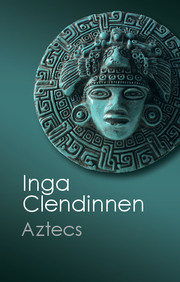Book contents
- Frontmatter
- Dedication
- Contents
- List of illustrations
- Acknowledgements
- Acknowledgements for Literary Material and Illustrations
- Note on Nahuatl
- Maps
- Epigraph
- Introduction
- Part I The City
- Part II Roles
- Part III The Sacred
- Part IV The City Destroyed
- A Question of Sources
- Monthly Ceremonies of theSeasonal (Solar) Calendar: Xiuitl
- The Mexica Pantheon
- Notes
- Select Bibliography
- Index
- Artefacts
Introduction
Published online by Cambridge University Press: 05 June 2014
- Frontmatter
- Dedication
- Contents
- List of illustrations
- Acknowledgements
- Acknowledgements for Literary Material and Illustrations
- Note on Nahuatl
- Maps
- Epigraph
- Introduction
- Part I The City
- Part II Roles
- Part III The Sacred
- Part IV The City Destroyed
- A Question of Sources
- Monthly Ceremonies of theSeasonal (Solar) Calendar: Xiuitl
- The Mexica Pantheon
- Notes
- Select Bibliography
- Index
- Artefacts
Summary
…men build their cultures by huddling together, nervously loquacious, at the edge of the abyss.
Kenneth Burke, Permanence and Change: An Anatomy of PurposeIn August 1521 the city of Tenochtitlan–Tlatelolco, once the magnificent centre of a great system of tribute exaction, but reduced in the course of its long and desperate defence to a place of desolation, fell to a body of Spaniards led by Hernando Cortés and a shifting coalition of Indian ‘allies’. So ended the public political exist-ence of the Aztecs, as we have come to call them. The word ‘Aztec’ has been used to mean a number of things, from the ‘empire’ which sprawled across much of modern Mexico, to the people of the magnificent lake city who were its masters. It is the people of the city in their last unthreatened years who are the subjects of this study. While the ‘Tlatelolca’ and the ‘Tenocha’ of the twin city strenuously maintained their separateness between themselves, they collectively called themselves the ‘Mexica’, as I will do, not least to avoid the heavy freight that ‘Aztec’ has come to bear. That word I will reserve for the tribute empire that the Mexica, in confederacy with other Valley of Mexico peoples, had constructed by the close of the fifteenth century.
This is a study built out of the attempt to catch attitudes and characteristic styles and emotions from scattered, fragmentary and defective texts. I want to discover something of the distinctive tonalities of life as it was lived in the city of Tenochtitlan in the early sixteenth century on the eve of the Spanish conquest. My interest is not primarily with the doings of the great and powerful or with the wisdom and aspirations of the élite, who unsurprisingly have generated most of the sources, but with some of the multiple ways in which ordinary Mexica men- and women-in-the-city-street made sense of their world.
- Type
- Chapter
- Information
- AztecsAn Interpretation, pp. 1 - 16Publisher: Cambridge University PressPrint publication year: 2014



